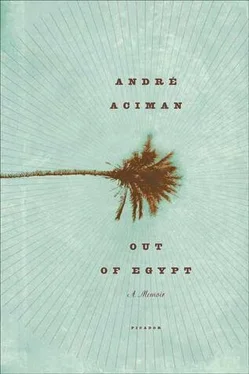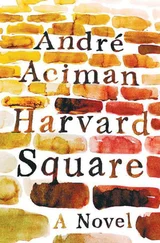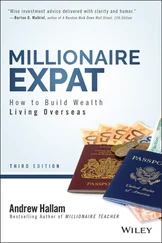Albert had ample reason for neither trusting nor wanting to help them. It was upon the clan’s assurances that in 1932 he had finally and recklessly liquidated his cigarette business in Turkey and moved with his family to Egypt, hoping both to invest in his in-laws’ firm and to spare his eighteen-year-old son, Henri, the horrors of Turkish barracks life. As soon as he arrived in Alexandria, however, the clan made it quite clear they were not about to let him into their Isotta-Fraschini schemes. Crestfallen, and not knowing what else to do in Alexandria, the erstwhile nicotine merchant took the life savings he had smuggled out of Turkey and became the proprietor of a small pool hall called La Petite Corniche, which faced the six-mile coast road known to all Alexandrians as the Corniche.
He never forgave them this trick. “Come, we’ll help you,” he would remind his wife, mimicking her brothers’ repeated appeals to him. “We’ll give you this, we’ll give you that. Nothing! My ancestors were important enough to be assassinated by generations of sultans — now, billiards,” he would mutter as he stood outside the kitchen door each morning, waiting for the assortment of cheese and spinach pastries that his wife baked at dawn. They sold well and were much liked by the pool players, who enjoyed eating something while drinking anisette.
Not only had his own circumstances been drastically reduced, but Albert was still expected to help out his wife’s family. And so Vili’s driver, thoroughly convinced that he was picking up money owed to his employer, would stop the car outside La Petite Corniche, walk in, receive a wad of bills, and “remind” Albert that he would be back in a few weeks.
After about the fifth loan, the humble proprietor of the pool hall walked outside with his cue in hand and shattered one of the car windows, informing his brother-in-law, who was skulking in the backseat while the chauffeur ran his errands, that since he was on such good terms with royalty, he should also tap His Majesty for “something to tide him over”—Vili’s euphemism for desperate loans.
Esther was horrified when she heard of the confrontation between her husband and her brother. “But he’s never done anything like this before,” she protested to Vili, “he’s not violent at all.”
“He’s a Turk, through and through.”
“And what are you then, Italian by any chance?”
“Italian or not Italian, I know better than to break someone’s car window.”
“I’ll speak to him,” she said.
“No, I don’t ever want to see him again. He’s a terribly ungrateful man. If he weren’t your husband, Esther, if he weren’t your husband—” started Vili.
“If he weren’t my husband, he wouldn’t have lent you a penny. And if you weren’t my brother, we wouldn’t be in the mess we are in now.”
Vili’s given name was Aaron. When he returned to Alexandria in 1922, four years after the signing of the armistice, he had to make up for lost time. With the help of his four brothers, he became a rice expert in one week. Then a sugar-cane examiner. In the space of three months he learned how to cure any conceivable disease afflicting cotton, Egypt’s prized export. In half a year’s time, he had not only toured all corners of Egypt but had also visited every magnate’s home rumored to hold the promise of a young Jewish wife. He married one a little less than a year after returning from Europe.
Having become a respectable citizen now, he reverted to what he liked best of all: married women. It is said that some of his mistresses were so distraught when he was done with them that they would show up on his wife’s doorstep, pleading with her to intercede on their behalf, which poor Aunt Lola, whose heart was the biggest organ in her body, would sometimes do.
Seven years after the war, a woman named Lotte appeared at the family’s residence with the picture of a man to whom she claimed she had been engaged in Berlin. When a consensus was finally reached on the man’s identity, and the woman had put away her handkerchief, she was invited to stay for lunch with the family, most of whose members were due to arrive toward one o’clock. Vili was the last to arrive, but as soon as he walked in, she recognized his footsteps in the vestibule, stood up, put down her glass of sherry, and ran out screaming, “Willy! Willy!” at the top of her lungs.
No one had any idea what the demented woman meant by calling their Aaron by that strange name, but during lunch, when everyone had more or less regained composure, she explained that in 1914 in his new Prussian uniform he had looked so much like Kaiser Wilhelm that she could not resist nicknaming him Willy. His wife found something so endearingly right about “Willy,” so stout yet so diminutive, that she too began to call him “Vili,” first with reproof, then with raillery, and finally by force of habit, until everyone, including his mother, called him Vili, which eventually acquired its diminutive Greco-Judeo-Spanish form: Vilico.
“Vilico traitor,” his mother said some time afterward.
He protested. “I was really in love with her at the time. And besides, it happened long before I’d met Lola.”
“I wasn’t talking about women. Judas you are, Judas you’ll always be.”
No one had the heart to ship the resurrected Lotte back to Belgium. So Lotte became Uncle Nessim’s secretary, served as a temporary model in Aunt Clara’s art class, then as a sales assistant for Uncle Cosimo, who eventually palmed her off on Uncle Isaac, who finally married her. In the family picture taken at their wedding in 1926 in the matriarch’s sumptuous apartment in Grand Sporting overlooking the sunny Mediterranean, Tante Lotte is standing next to Uncle Isaac on the veranda, her right hand resting on Uncle Vili’s shoulder. Are we, squints Uncle Vili, or aren’t we men who share, men who exact the highest sacrifices, men whom women worship.
In the picture, Isaac is already a haggard fifty-year-old trying to cover up a bald spot, and Nessim, then close to retirement, looks older than his mother, whose forced good cheer on the day of her son’s nuptials failed to conceal her worries.
“He’s a prince, and she’s a peasant,” she said. “Look how she walks. You can still hear the clatter of Batavian clogs in her steps.”
“And on his head you can still see traces of an invisible skullcap. So they’re even. Leave them alone,” her daughter Esther chided. “All his life with mistresses, and never a wife. It’s about time he married.”
“Yes, but not a Christian.”
“Christian, Jewish, Belgium, Egypt, these are modern times,” said Vili, “the twentieth century.”
But his mother was not convinced. And in the picture she wears the distrustful gaze of a Hecuba welcoming Helen into her fold.
In back of the assemblage, peeping ever so furtively from behind the veranda’s French windows, are the faces of three Egyptians. The maid, Zeinab, no older than twenty and already in the family for a decade, is smiling mischievously. Ahmed, the cook, who is from Khartoum, bashfully attempts to avert his eyes from the photographer, covering his face with his right palm. His younger sister Latifa, a mere child of ten, stares with impish dark eyes into the lens.
While the family tried to recover from the Isotta-Fraschini debacle, Uncle Vili was busily pursuing an altogether different career: that of a Fascist. He had become such an ardent supporter of Il Duce that he insisted everyone in the family wear a black shirt and follow the Fascist health regimen by exercising daily. A punctilious observer of all changes inflicted on the Italian language by the Fascists, he tried to purge acquired Anglicisms from his speech, tastes, and clothing; when Italy went to war against Ethiopia, he asked the family to surrender its gold jewelry to the Italian government to help finance Il Duce’s dream of an empire.
Читать дальше












